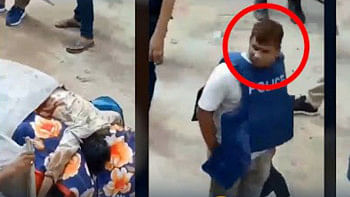Khaleda agreed initially

Soon after the imposition of the state of emergency in January 2007, the army had asked BNP Chief Khaleda Zia to send her elder son Tarique Rahman abroad and “clean up the party so that she could still lead the country.”
Initially, Khaleda agreed but shifted her stance later, said a US embassy cable from Dhaka quoting the then BNP Secretary General Abdul Mannan Bhuiyan. WikiLeaks, an anti-secrecy organisation, published the cable on its website on August 30.
The cable revealed how desperately the BNP chief tried to save Tarique and her younger son Arafat Rahman Koko, who were detained on corruption charges during the tenure of the army-backed caretaker government in March and April, 2007.
Khaleda met the US ambassador in private at a local hotel on May 25. She requested the ambassador to support her embattled sons Tarique and Koko and said “she was ready to leave Bangladesh and not return.”
In April, Tarique's wife Dr Zubaida Rahman spoke with the US embassy and confirmed it of Khaleda's decision to leave.
"Dr Rahman said Coco's [Koko] arrest, coupled with threats by the military to file charges against Zia and 'create more trouble for' Tarique, left Zia with no other choice," the cable said.
"Dr Rahman claimed the only condition the family is seeking to impose is the release of Tarique on bail on compassionate grounds with permission to travel abroad for medical treatment."
US Ambassador Patricia A Butenis paid her farewell call on the BNP chief at a small function room at the Sheraton Hotel in Dhaka on May 25, 2007.
Accompanied by a note-taker, the US ambassador met Khaleda Zia and Zubaida Rahman privately before having a broader political conversation that included a dozen party functionaries, largely unknown, according to the cable.
It said Khaleda, noticeably thinner but still elegantly coifed and attired in a lace sari, turned to her daughter-in-law to plead Tarique's case and appeal for US and international support.
An articulate pediatrician who normally says little at social functions, Zubaida argued passionately that her husband was being falsely charged and abused out of envy over his mass popularity and his unwavering commitment to national service.
Handing over copies of medical reports dating back to 2003, she said Tarique should be given bail on medical grounds and should be shifted out of the general jail population to the special quarters reserved for social elites, the cable said.
The cable said: "Khaleda Zia urged the ambassador to support her embattled sons Tarique and Koko, asserted she was ready to leave Bangladesh but the government failed to get her a Saudi visa, said she has no contact with the military, and is mystified by the military's actions and objectives."
Tarique was the most influential BNP leader during the tenure of the last BNP-led coalition government. He used to run controversial Hawa Bhaban, an alternative power centre of the government.
He had been appointed BNP senior secretary general in 2002 following demands from the party's young leaders who also forced the then President Badruddoza Chowdhury to step down in June the same year.
Tarique and his associates' involvement in corruption, and their interference in government activities drew widespread criticism.
But in the meeting with the US ambassador on May 25, 2007, Khaleda and Zubaida stoutly denied that anyone in the family has money or property overseas. Khaleda said: "Blame the corrupt but my family is not corrupt."
Khaleda claimed to be surprised by the military's actions against Tarique and Koko, who was "very sick."
The then BNP secretary general Abdul Mannan Bhuiyan spoke about reported corruption of Khaleda's sons and others.
"On March 18, [of 2007] Bhuiyan bitterly criticised to us former Prime Minister Zia for allowing her sons, brothers, and other relatives and political intimates to indulge in unbridled corruption," read the cable.
He said BNP members who were not in Tarique's faction complained about him privately. They sometimes mentioned his corruption and heavy-handed tactics, but what appalled many of them was his youthful arrogance.
Bhuiyan said some claimed to be threatened by intelligence services as a result of their anti-Tarique stance.
“It takes a party leader of Saifur Rahman's stature as finance minister and a party founder to survive losing challenges to Tarique's influence in party affairs, which was driven only by Saifur's desire to protect the interests of his own notoriously corrupt son, BNP MP Nassir Rahman,” the cable said quoting Bhuiyan.
The BNP chief did not leave the country in the end. But her two sons went abroad on parole for treatment in September and May, 2008 and are still out of the country.

 For all latest news, follow The Daily Star's Google News channel.
For all latest news, follow The Daily Star's Google News channel. 




Comments